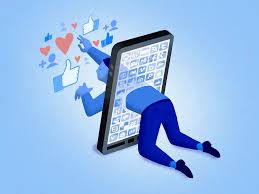By Chioma Emma
Social media has become an integral part of our daily lives, with billions of people around the world using platforms like Facebook, Instagram, Twitter, and TikTok to connect with others, share their experiences, and consume information. However, a growing body of research suggests that excessive social media use can have a profound impact on our mental health, leading to increased symptoms of anxiety, depression, loneliness, and low self-esteem.
In this article, we’ll take a closer look at how social media can affect our mental well-being, explore the latest research and expert opinions, and discuss potential solutions and strategies for healthy social media use.
Constant stream of information
One of the primary ways in which social media can impact our mental health is through the constant stream of information that we’re exposed to. Social media platforms are designed to be highly engaging, with endless scrolls, notifications, and alerts that activate our brain’s reward system and release feel-good chemicals like dopamine. This can lead to a state of constant distraction, making it difficult for us to focus and relax.
Moreover, the information that we’re exposed to on social media is often curated to present a highlight reel of other people’s lives, showcasing their accomplishments, relationships, and exotic vacations. This can create unrealistic expectations and a sense of inadequacy, as we compare our own lives to the seemingly perfect lives of others.
Impact on self-esteem
Social media can also have a profound impact on our self-esteem, particularly for young people. A study published in the Journal of Youth and Adolescence found that social media use was associated with lower self-esteem, body satisfaction, and life satisfaction in adolescents. Another study published in the Journal of Social and Clinical Psychology found that limiting social media use to 30 minutes per day can lead to significant improvements in self-esteem and body image.
The constant stream of information on social media can also lead to a sense of FOMO (fear of missing out), as we feel pressure to keep up with the latest trends, events, and news. This can create a sense of anxiety and stress, as we feel like we’re constantly missing out on something important.
Link to depression and anxiety
Excessive social media use has also been linked to depression and anxiety. A study published in the Journal of Social and Clinical Psychology found that social media use was associated with increased symptoms of depression and anxiety, particularly in individuals who used social media for more than two hours per day.
Another study published in the Journal of Adolescent Psychology found that social media use was associated with increased symptoms of depression, anxiety, and loneliness in adolescents. The study also found that social media use was associated with decreased face-to-face social interaction, which is an important predictor of mental health.
Solutions and strategies
So, what can we do to mitigate the negative impact of social media on our mental health? Here are a few solutions and strategies that you can try:
1. Set boundaries: Limit your social media use to specific times of the day, and avoid using social media before bed.
2. Take breaks: Take regular breaks from social media, and consider deleting social media apps from your phone for a few days or a week.
3. Use social media intentionally: Use social media with a specific purpose in mind, such as staying in touch with friends or staying up-to-date on news and events.
4. Follow accounts that promote positivity and wellbeing: Unfollow accounts that make you feel bad about yourself, and follow accounts that promote positivity and wellbeing.
5. Practice self-compassion: Remember that everyone on social media is presenting a curated version of themselves and that it’s okay to have flaws and imperfections.
Final take…
Social media has become an integral part of our daily lives, but excessive use can have a profound impact on our mental health. By understanding how social media can affect our mental well-being, and by implementing strategies for healthy social media use, we can mitigate the negative impact of social media and promote positive mental health. Remember to set boundaries, take breaks, use social media intentionally, follow accounts that promote positivity and well-being, and practice self-compassion. By taking these steps, we can create a healthier and more positive relationship with social media.

